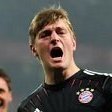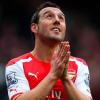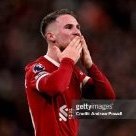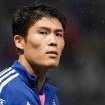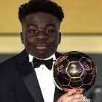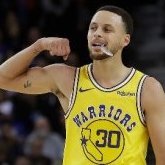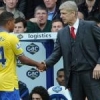Classement
Contenu populaire
Affichage du contenu avec la meilleure réputation le 10/02/19 dans Messages
-
5 points
-
@Peter Pan Article très bien écrit. Le club se restructure en interne. Il y a des zones d'ombres (départ de Mislintat, lien avec des agents influents...) mais le club a le mérite d'essayer de se moderniser (division des tâches, création d'un modèle capable de résister au changement d'entraîneur , etc.). À voir le résultat sur le long terme. Bonne lecture : " Inside the revolution : How Arsenal plan to reclaim place among world's elite club. Per Mertesacker shifts forward in his seat. “Everybody says it: ‘The Arsenal Way’… but what does it actually mean?” There is a mischievous glint in the German’s eye. “Is it offensive, passing football? Everybody does that!” he scoffs. “We need more. We need a framework — one that gives kids a freedom to play, but that also has certain kinds of measurements so we can say, ‘This is how we’re going to play, this is Arsenal, this is world class.’” With each of those last three statements, the former Arsenal captain bangs a fist on the table for emphasis. The gentle giant is stirring. “I’ve presented it to Edu,” Mertesacker reveals to The Athletic. The Brazilian was appointed as Arsenal’s first ever technical director back in July, and has since sat down with Mertesacker to sketch out the blueprint for the ideal Arsenal player. “Just to give you a brief idea: we want to dominate possession but we want to win it back as soon as possible. So we have to set these principles and train in that way… I’ve built a framework towards that, because I wanted to shape it.” It is just 17 months since Mertesacker retired from playing to take up his role as head of Arsenal’s academy, but he’s in no mood to reflect on previous glories. “We want to make sure that we’re up to date and not thinking about what ‘The Arsenal Way’ was 15 years ago. We need to make sure that everyone understands what we’re about.” Speaking with this clarity and this passion, it won’t be long before everyone does understand. Arsenal are a club finally talking about putting the past behind them, and looking towards the future. Last night Arsenal played out an uninspiring 1-1 draw at Old Trafford. In the final 20 minutes, this felt like a match that was absolutely there for the taking — and yet these two teams had neither the confidence nor the quality to do it. The fixture has certainly lost a good deal of the glamour and drama it once had. Under Arsene Wenger and Sir Alex Ferguson, these clubs once dominated the landscape of English football. However, the end of those managerial dynasties — and the emergence of new and powerful rivals — has seen those giants fall by the wayside. A clash between Marcus Rashford and David Luiz doesn’t quite have the electric appeal of Ruud van Nistelrooy coming face to face with Martin Keown. In the TV studio, Roy Keane described the lack of quality as “frightening”. These are teams undergoing awkward periods of transition, scrabbling furiously to return to former heights. Neither set of supporters seem convinced by the men in the dugout. Ole Gunnar Solskjaer is more obviously a talisman than a tactical genius, while Unai Emery does not appear any closer to impressing his vision upon this Arsenal team than he did a year ago. However, while progress on the pitch may feel frustratingly slow, away from the floodlights Arsenal are a club rapidly evolving. Both United and Arsenal are attempting to move on from generational managers. However, the latter would seem to be making the better job of it. It is over six years since Ferguson’s retirement, but United’s football infrastructure is still desperately lacking. They remain a financial powerhouse, but their position as football royalty is under threat. Make no mistake, Arsenal have a long way to go too, but they’re at least heading in the right direction. While United fans spent the summer waiting for a sporting director that never came, Arsenal were welcoming Edu and putting the finishing touches to an impressive executive offering. As Mertesacker might put it, they have a “framework” in place. Arsenal’s team behind the team is looking stronger all the time. Arsenal have been a club in desperate need of modernisation. For more than a decade they were defined by the Emirates Stadium project, functioning more like a property development business than a football club. On the sporting side, Wenger was the single point of failure. That had to change. The process began under Wenger and former chief executive Ivan Gazidis. The Frenchman was aware that Arsenal had grown too big for one man to effectively rule alone. Wenger may have set the change in motion, but even he will have recognised that Arsenal’s new model could not really take hold until he left the club. Nevertheless, Wenger played his part, driving the appointment of Australian Darren Burgess as head of performance. Burgess was installed in a training ground office adjacent to Wenger’s, and set about revamping a performance team that had presided over a horrifying injury record. In June 2017, Gazidis appointed legal expert Huss Fahmy from cycling giants Team Sky to lead contract negotiations. It wasn’t exactly the kind of summer signing to get the fans talking, but Fahmy’s influence would steadily grow over the next 12 months. If Edu was eventually to be the final piece in the jigsaw, the journey to appointing him began at a meeting between Gazidis and Raul Sanllehi. A former executive at Nike and Barcelona, Sanllehi was a well-known figure on the European scene and a natural choice as Arsenal’s head of football relations. The Spaniard had the cocktail of business and football knowledge Arsenal needed — and the language was never going to be a problem for a man who had spent four years in the USA studying economics at North Carolina’s Guilford College. It was Sanllehi who sold Gazidis on the idea of adopting the technical director model, having played his part in mapping the executive structure at Barcelona. Sven Mislintat was the man initially primed for the role. Gazidis lured the scout known as “diamond eye” from Borussia Dortmund to be the club’s head of recruitment, on the understanding he would step into the newly-created technical director position once Wenger had gone. The appointments of Sanllehi and Mislintat were announced within a week of each other in November 2017. While Wenger’s situation remained uncertain, Arsenal had begun laying the foundations for the future. The club have shown creditable foresight throughout this process. Although Mertesacker only took up his role as head of the academy in the summer of 2018, it was February 2017 when the veteran defender was summoned to meet Wenger and Gazidis at the training ground. Mertesacker anticipated a conversation about his future as a player — instead, they asked whether he would consider leading the academy after his retirement. Writing in his autobiography, Big Friendly German, Mertesacker revealed that a phone call to Oliver Bierhoff, the general director of the German national team, provided all the encouragement he needed to accept the offer. With playing time limited in his final season, Mertesacker embraced the opportunity to swot up on his new job. He told The Athletic: “I knew that a new challenge was coming up, so I made sure I was part of the interview process for any academy jobs, that I was part of (any) thinking about the vision for the academy, that I met people from the academy… I was transitioning, making sure that I would be well prepared for something that was totally unknown to me.” In some ways, Mertesacker’s appetite for change is emblematic of how Arsenal have set about the task of reinventing themselves. He has rapidly transformed from steady defender to quick-thinking executive. Mertesacker clearly feels duty-bound to ensure the kids in Arsenal’s academy receive a good all-round education — he insists he would be as proud to produce a doctor as a defensive midfielder. However, his ultimate goal is to provide players for the first team, and he quickly assembled the right staff to help him do that. Gazidis and Mertesacker led a headhunting process that ultimately saw them recruit Marcel Lucassen as head of coach and player development. Lucassen was well known to Mertesacker, having been, according to the DFB, “responsible for the individual technical and tactical development of all German youth national teams” between 2008 and 2015. Lucassen is a disciple of the Dutch school of football development, and brought a wealth of technical expertise to the academy. Weeks later, Mertesacker rubber-stamped the appointment of Freddie Ljungberg as coach of the under-23s, citing his understanding of “how important it is to give young players the opportunity to grow”. Tellingly, he also told the media “we look forward to Ljungberg developing his career with us”. Mertesacker and Lucassen weren’t just setting out to hone young players: they were also developing a coach. The next stage was to set about creating pathways for player development. Arsenal recognised a need to make better use of the loan market, and within six months of Mertesacker’s start they promoted former ProZone analyst Ben Knapper to the newly-created role of loans manager. Knapper not only curates statistical analysis of Arsenal players during their loan spells — he also acts as player liaison, visiting loanees and reporting back to the club. The first stage of Arsenal’s evolution was complete. However, the turbulent summer of 2018 threatened to knock things off course. Wenger’s departure was unsettling, yet inevitable. However, the loss of Gazidis came as a greater shock. Just as the chief executive appeared primed to seize control of the club he had served for 10 years, he left for AC Milan. The man who had appointed Sanllehi and Mislintat was gone, project unfinished and promises unfulfilled. The owners, Kroenke Sports & Entertainment, responded by dividing Gazidis’ role in two. In the post-Wenger world, Arsenal were determined to delineate responsibility. Sanllehi was promoted to head of football, and chief commercial offer Vinai Venkatesham became managing director. At long last, sport and business were distinct at Arsenal. How Ed Woodward might learn from that. A year earlier, Gazidis had spoken of Arsenal’s poor 2016-17 season as being a potential “catalyst for change”. As it turned out, one of the biggest catalysts for change was his own departure. Another significant milestone on this journey came in August 2018, when Stan Kroenke’s KSE took full ownership of the club. Buying out Alisher Usmanov, and indeed the remaining minor shareholders, gave the Kroenkes complete control of Arsenal. It was a move met with considerable hostility by the fans, who understandably mourned the loss of any transparency to the club’s dealings. Since that summer, the pace of change has only increased. On the football side, Sanllehi swiftly stepped into the power vacuum. This was a man who had kept his job at Barcelona despite two presidential changes — he is clearly one of football’s survivors. Over the next few months, Mislintat became increasingly marginalised. His eye for talent had already borne fruit, bringing in talented young players such as Bernd Leno, Matteo Guendouzi and Lucas Torreira. However, with Gazidis gone, the technical director role he had been promised was slipping away from him. As Mislintant later explained in an interview with German football magazine 11Freunde, “It had actually been agreed that I would become technical director, so then I would be around the team on a daily basis. But the new leadership had their own agenda and other candidates.” Sanllehi valued Mislintat as a world-class scout, but the German’s ambitions were loftier than that. By January 2019, his departure had been mutually agreed. Arsenal’s first-choice candidate for the position of technical director was Monchi, the Spaniard widely regarded as the mastermind behind Sevilla’s success between 2000 and 2017. He was the man credited with spotting the likes of Dani Alves, Julio Baptista, Seydou Keita and Ivan Rakitic. Crucially, he also had a strong relationship with Emery — together they had led Sevilla to three consecutive Europa League titles between 2014 and 2016. When Monchi left his job at Roma by mutual consent in March of this year, Arsenal thought they had their man. Members of the performance staff were even briefed about the prospect of meeting Monchi to discuss plans for preseason. However, a late change of heart saw him decide to return to Sevilla. For Arsenal, it was back to the drawing board. And back to Edu. The Brazilian had been contacted about the position earlier in the process, but Monchi’s connection with Emery had pushed the Spaniard to the forefront. With that option off the table, the man who played for the club between 2001 and 2005 was in contention again. Edu was effectively the operations co-ordinator for the Brazilian national team, but had previously held a technical director position at Corinthians. When coach Tite left the club to take over the Selecao, he insisted Edu come with him — he had swiftly made himself indispensable. He will now look to do the same at Arsenal. He certainly started as he meant to go on, throwing himself into the job. As soon as his duties at the Copa America with Brazil were done, Edu joined Arsenal on their north American summer tour. It was there he first addressed the squad about his directorial approach. As he puts it himself: “I explained to the players that I’m not the guy who stays inside the office and waits for someone to knock on my door and send a message to me. I want to be involved in the process, I want to be on the inside, I want to be with them, I want to be with Unai… I want to be with the staff as well, to try and advise them if they need it, and give some advice for them. Being involved is important and that’s what I really believe from today.” The club speak of Edu as a “connector”, someone who must establish an easy flow between the first team, the academy and the coaching staff. He has set up an office at London Colney and is a regular presence at training: watching, learning, talking. While Woodward discusses commercial strategy at United’s London headquarters, Edu is at the heart of things, steadily building the relationships that define his role. It may ultimately prove to be a good thing that he is not as close to Emery as Monchi was. Arsenal are building a model which has the durability to withstand a change in coach. Publicly, they say the advantage of this approach is that it enables the coach to focus on the next game. Contained within that is a tacit admission: not only is a coach’s focus short-term, but increasingly so is their tenure. Emery’s current contract runs no further than 2021; Arsenal have built an infrastructure to outlast him. And so to this past summer’s transfer window. Arsenal have been keen to stress that Edu was not directly responsible for their recruitment drive. Plans were, in fact, largely set in motion long before the window opened. Sanllehi headed up the process, with long-serving Spanish scout Francis Cagigao effectively replacing Mislintat as head of international scouting. Arsenal’s summer spend was interpreted by some as a response to fan unrest and their Europa League final humiliation by Chelsea. However, the groundwork for many of their signings had already been laid. In the case of record signing Nicolas Pepe, The Athletic understands intermediaries held discussions about a prospective deal as early as February. In the context of that information, the supposedly “derisory” bid for Wilfried Zaha looks increasingly like a ploy to force Pepe’s camp into a decision. Under Sanllehi, Arsenal are a different animal in the transfer market. Their supporters’ first encounter with Sanllehi was when he led the Barcelona delegation attempting to lure Cesc Fabregas back to Catalonia. He’s now bringing that same determined approach to north London. With Fahmy (promoted to director of football operations in 2018) leading the negotiating team, Arsenal are a much more dynamic outfit. As one agent with experience dealing with the club told The Athletic: “In the past, Arsenal were regarded as a soft touch. You can’t say that about Sanllehi.” When it comes to agents, few wield more power than Kia Joorabchian. He’s exactly the kind of ‘super agent’ Wenger was reluctant to deal with. In the midst of the Arsenal fan protests in July, it was telling that Joorabchian leapt to the defence of Arsenal’s new leadership. “I feel for the guys that have just come in – Raul [Sanllehi – head of football] and Edu and Unai Emery,” he said. “I feel for them because we have finally got incredibly knowledgeable footballing people there. Raul came in from Barcelona, Edu came from the Brazil national team and is a legend at Arsenal, and Emery is a fantastic coach who has coached at Sevilla and PSG. “Finally Arsenal have people who really understand football and are footballing people in the backroom staff, but the question is whether or not the finances will be made available.” There’s considerable merit in what Joorabchian says, but perhaps he should also have declared a bias. The Iranian-born agent has close links with Edu from his time at Corinthians, and has dealt with Sanllehi at Barcelona. And at Arsenal. After a protracted hunt for a new centre-half, the Gunners made Joorabchian client Luiz their final signing of the window. Interestingly, the last player to leave Arsenal this summer was Henrikh Mkhitaryan — represented by Mino Raiola, another of the supposed ‘super agents’. Arsenal are playing with the big boys now. The likelihood is that the club have paid out an eye-watering sum in agent fees this summer. However, that is the price of competing in the current market. They have bent their principles to modernise their approach. Joorabchian questioned whether money would be made available to spend, and ultimately it was. Only Manchester United spent more money than Arsenal, and it’s fair to question whether it was spent as wisely. The final tally was almost £150 million, albeit largely amortised over several years. With Usmanov no longer standing to profit from Arsenal’s success, the Kroenkes appear more willing to loosen the purse-strings. They’ve cleared the decks too, rejuvenating an ageing squad and creating space for an influx of Mertesacker’s academy talent. To help the younger players transition into the senior squad, Ljungberg has been promoted to work under Emery. Within 12 months of being brought back to the club by Mertesacker, Ljungberg is assistant first-team coach. Sceptics suggested the move might be purely cosmetic, but anyone who has seen the Swede providing detailed instructions to the club’s younger players on the sidelines will know he is a coach of considerable substance. The use of young players is clearly strategic. United used Mason Greenwood off the bench against Arsenal because of an injury crisis; Chelsea are playing Tammy Abraham because they are under a transfer ban. Arsenal turning to their academy feels like part of a coherent plan. There have been other training ground changes. Steve Bould returned to the sort of role he relishes, taking full responsibility for the under-23 side and coaching the next generation of Arsenal player. Despite generating impressive numbers in 2018-19, Burgess was moved on as head of performance with American Shad Forsythe stepping up as his successor. Both men had arrived at Arsenal with big reputations — and salaries to match. In a summer of streamlining it seems the club felt retaining both was unnecessary. The performance team are informed by swathes of data. Arsenal’s purchase of US-based Stat DNA has afforded them a significant advantage, and they’ve supplemented that by recruiting high-profile personnel such as Candy Crush guru Mikhail Zhilkin to work on new methods of data gathering and visualisation. As Old Trafford begins to creak — early this year, water poured through a hole in its roof — the Emirates stands resplendent. Arsenal’s players prepare in a state of the art training facility, planned by Wenger, upgraded by Gazidis and now overseen by Sanllehi. All the while the likes of Edu and Mertesacker, men steeped in Arsenal’s culture and history, plot the club’s future. “The Arsenal Way” is being reimagined. For so long, Arsenal felt stagnant— and now, so much is changing. They must improve as a team — an insipid performance at Old Trafford was clear evidence of that — but the foundations they have put in place make that seem infinitely more plausible. Whatever Emery’s ultimate fate, the club have built a structure which will enable them to survive a managerial change with minimal trauma. Arsenal are emerging from Wenger’s long shadow as the very model of a modern major football club. Source : James McNicholas, 1.09.2019, Athlétique.3 points
-
Tu crois une seule seconde qu'il aurait préféré Arsenal à Liverpool si Liverpool le voulait vraiment ? Oh please..2 points
-
Tu dis a quelqu'un de ne pas déformer et tu inventes un truc 2 s après.... Magique. Liverpool s'est renseigné fin juin sur Pepe, on a vu le prix on est parti en courant. Pas que pour son niveau etc mais parce qu'on a tout simplement pas d'argent. D'ailleurs on a pris personne pour l'équipe première. La seule piste était Couti mais trop cher, Klopp l'a dit clairement en conf de presse que c'est lui qu'il voulait reprendre. Pepe je pense qu'il vous fera du bien mais inventer des pseudo intérets d'autres club en se basant sur une rumeur (alors que il y a en a.. 17000 par mercato) c'est osé. Et 80M pour Pepe c'était clairement trop, beaucoup ici ont vu que ses stats gonflés par les péno mais pour avoir suivi Lille il a toujous été discret dans le jeu. C'était Zaha qu'il fallait prendre (pour jouer a gauche déjà et Aubam à droite) et non Pepe.2 points
-
HATTRICK for Serge Gnabry. Deuxième mi-temps parfaite de sa part. Aucun déchet technique. Maintenant il lui reste à faire ses preuves contre autre chose que ces équipes du championnat allemand en chiffon.2 points
-
Franchement si y avait pas de mode club pro je l'aurais absolument pas acheté Je joue beaucoup plus online qu'offline hormis quelques fois en mode carrière que j'ai pas encore testé (apparemment l'ordi est nul et le mode carrière est buggé de fou et ça a absolument pas changé), le gameplay est tellement horrible. C'est un peu la même connerie que le 19 avec juste les slides qui changent, cette fois ils ont favorisé les joueurs rapides/techniques/dribbleur. Le "script" est toujours aussi présent (le pourcentage de buts après le coup d'envoie, la 45ème et la 90ème...), tu passes une mi-temps où tu détruis ton adversaire et ensuite la deuxième mi-temps tu te fais bouffer par je ne sais quel tour de magie. Un gameplay qui est extrêmement stéréotypé, tout le monde joue avec une défense regroupé et 3 flèches en attaque en contre-attaque. Quand à la défense c'est bien d'enlever la défense automatique mais les ordis sont désormais apathiques et la gestion de la profondeur.. Mon Dieu... En gros maintenant si vous voulez survivre, vos défenseurs doivent avoir au moins 70 de vitesse sinon ils sont perdus Pareil au niveau des passes déjà le physique des passes est super chelou avec plein de passes avec rebond et assez irréaliste à quel point dans cet opus c'est très difficile je trouve d'intercepter le ballon. Ah et aussi les centres sont devenus absolument impossible à mettre. Le mode Volta est pas ouf, et puis bon tout le monde s'en fout maintenant. FUT a pris une dimension assez énorme et puis bon c'est tellement facile d'avoir une giga équipe avec 40 cartes multicolores en seulement 2 semaines. En gros du réchauffé du 19 avec un peu moins de contre favorables, moins présent mais toujours aussi irréel et dévastateur, et un gameplay plus axé vers la vitesse. Si vous jouez pas trop en club pro ou avec vos potes franchement passez votre chemin, il en vaut absolument pas le coup.1 point
-
Non mais je suis le premier à taper sur Xhaka mais contre MU il est pas aussi mauvais que vos commentaires puissent le laisser penser. Il est moyen comme toute l'équipe à part Guendouzi, Kolasinac et Sokratis qui sont plutôt bon/très bon. Le plus grand fautif c'est clairement Emery.1 point
-
Mdr c'est osé ca quand même. Déjà pourquoi Liverpool le pisterait alors qu'on aurait jamais pu l'acheter (cf décla du board et Klopp pour Couti et le fait qu'on ai eu... 0 recrue hormis pour les U23) ? Et entre le champion d'europe, qui joue 60 matchs par saison donc il aurait largement eu du temps de jeu, où il aurait pu évolué sous Klopp et Arsenal qui est en Europa cette saison avec Emery a sa tete le "et ne les aurait pas choisi dans tous les cas" est d'une arrogance sans nom. Sanchez avait choisit Arsenal plutot que Liverpool a l'époque car le projet était plus attrayant, faut le reconnaitre. Mais là pour Pepe, c'est l'exact inverse. Et pour Pepe a Lille j'ai du regarder plus de 30 matchs de Lille la saison dernière donc yes je sais de quoi je parle. Pepe s'adaptera bien à la PL, j'en doute pas. Mais il n'est pas non plus le joueur incroyable que certains veulent vendre ici. J'ai lu des "son talent c'est quasi du jamais vu" quand même.. mdr. Et le plus gros problème de ce recrutement c'est que a droite vous auriez pu mettre Aubam. C'est a gauche que vous aviez besoin de quelqu'un : ZAHA.1 point
-
C'est ce qu'on appelle un choix de carrière... Ne pas sauter les étapes, les ambitions de jouer tous les week-ends, tout ça tout ça. Il y a des joueurs qui font des choix judicieux pour leur carrière, même si ce n'est pas donné à tout le monde de réfléchir semble-t-il C'était la condition si ne qua non de lui et de ses agents. Être sûr de pouvoir jouer tous les week-end, d'où le choix fait dans la short list.1 point
-
Le ptit coup en douce que Xhaka met en cachette à l'adversaire(sur un contre de MU par exemple) quand l'arbitre ne le regarde pas (tirage de maillot, baleyette, high kick, sonic boom, Tatsumaki Senpukyaku et tous le reste .... ).1 point
-
Je suis sidéré par son piètre niveau lui qui avait le potentiel pour être dans les 2 ou 3 meilleure regista européen.1 point
-
Il est jouissif ce sentiment, ça me rappelle un Hoffenheim-Liverpool (où l'inverse). Nostalgie1 point
-
@Scouser C'est la même pour le Bayern. Ils étaient intéressé, l'ont suivi. Ils ont estimé qu'ils avaient un déchet technique et une incapacité à jouer dans les petits espaces trop important pour le très haut niveau. Et quand ils ont vu le prix ils ont rigolé et se sont certainement dit qu'il vaut mieux aller chercher Sané pour 30M€ de plus. Et après la blessure de Sané rebelote les médias ont lâché que le Bayern allait venir chercher Pepe mais ils ont préféré Perisic en prêt pour une broutille.1 point
-
1 point
-
1 point
-
1 point
-
Je le mets pas au dessus de Alisson, Ederson et De Gea quand même. Mais il est très bon oui, heureusement j'ai envie de dire.1 point
-
Vous pensez que ça prend combien de temps exactement pour comprendre à 100% une nouvelle façon de jouer, de nouveaux adversaires et de nouveaux partenaires, sachant que vous commencez sans parler la langue ? Non parce que là Pépé il a joué moins de 10 matchs avec nous et on lit déjà des golden post comme "pire match depuis 1999", "on s'est pris une belle douille" ou "un Walcott des mauvais soirs était plus utile". Moins de 10 matchs les gars. Moins de 10. Une majorité de ses premiers matchs sont décevants mais bordel apprenez un peu à prendre du recul... Qu'on parle de Gareth Bale qui a regardé au moins la moitié des matchs du Real depuis l'infirmerie ou de Pogba qui doit compter autant de bons matchs que de mauvais, les deux ayant été payé plus de 80m et étant dans leurs clubs depuis au moins 3 ans, je comprends, mais là...1 point
-
Je comprends vraiment pas ce désir, cette manie de faire de ton Milieu défensif un joueur offensif.. Ca me rappelle les ITW d'Arsène Wenger au sujet de Song où il disait qu'il pouvait apporter offensivement etc alors que le mec assurait grave en tant que MDef. Résultat ? Song s'est perdu dans une espèce de rôle hybride.. Alors oui il y a eu des beaux gestes et des belles passes à sa décharge, mais on était bien moins solide défensivement au final.. On y est totalement là..1 point
